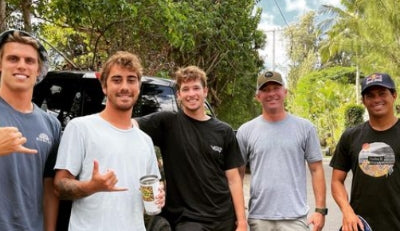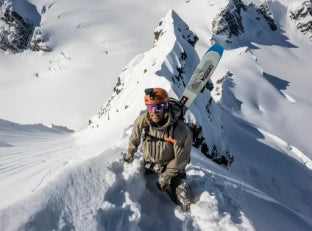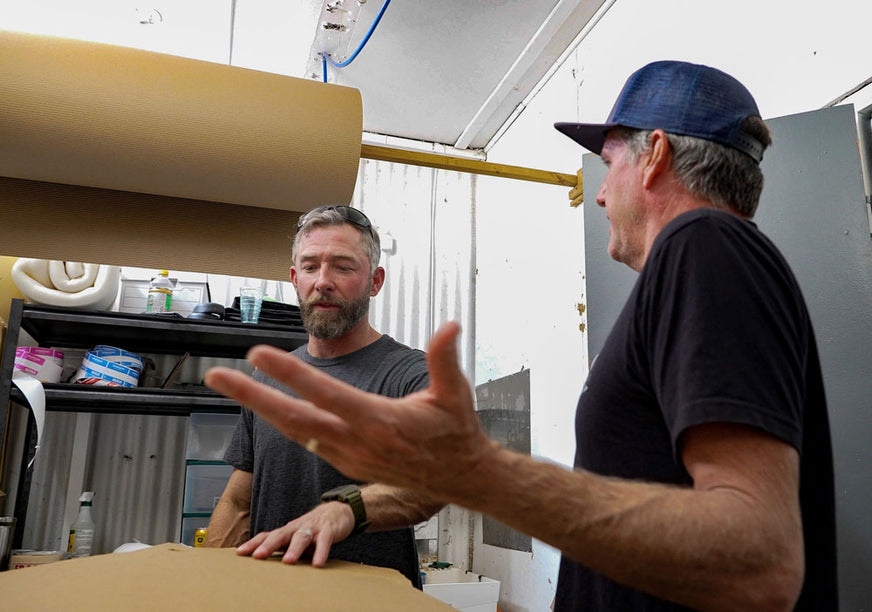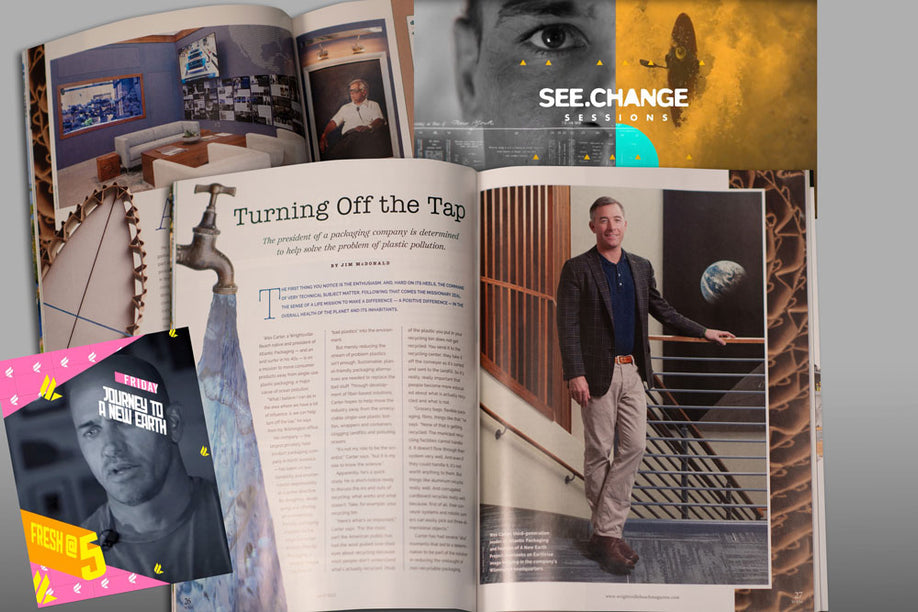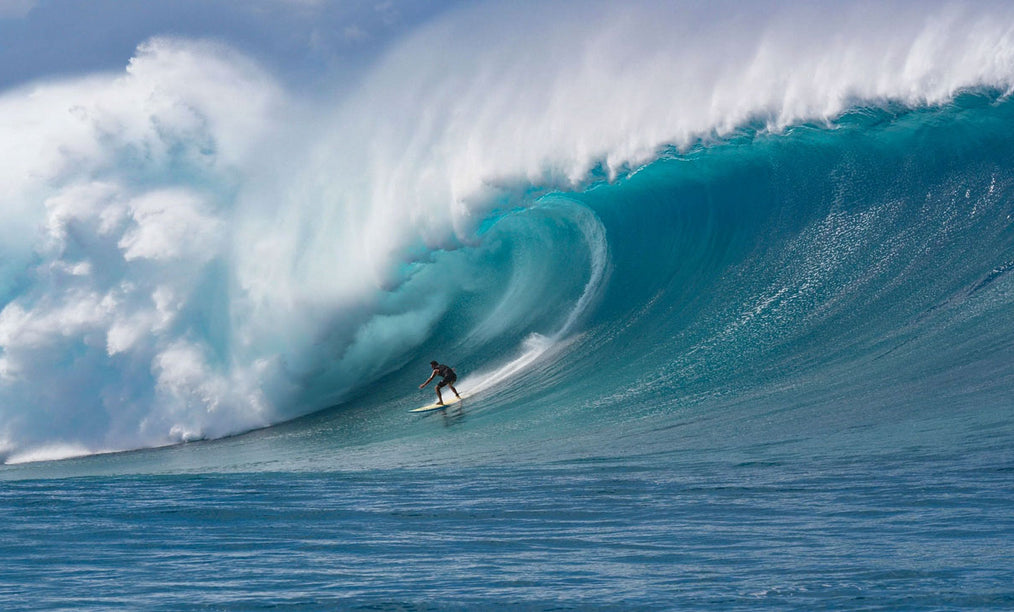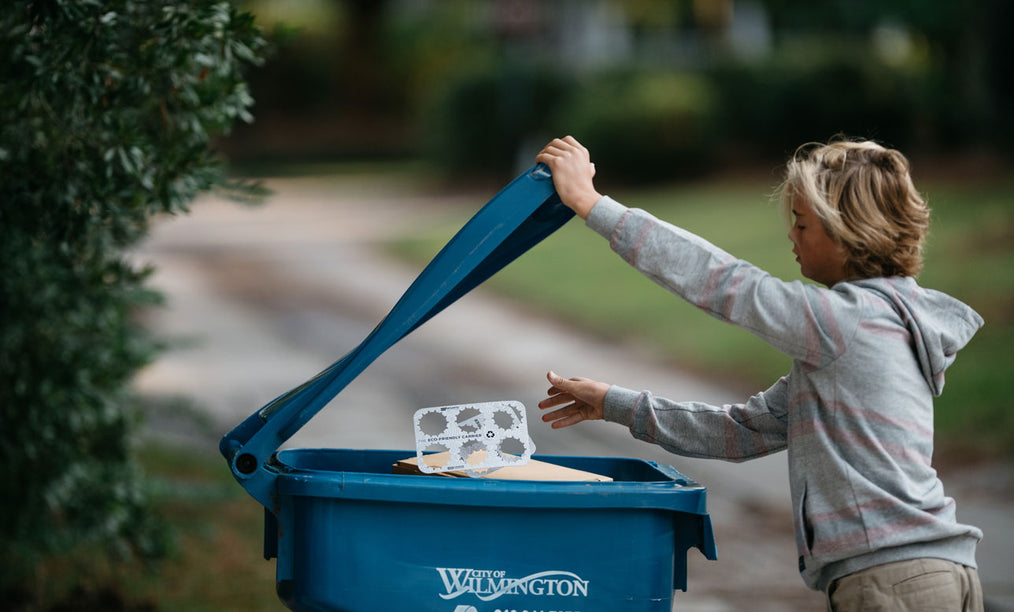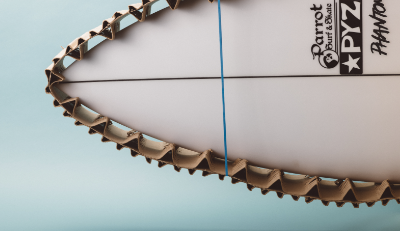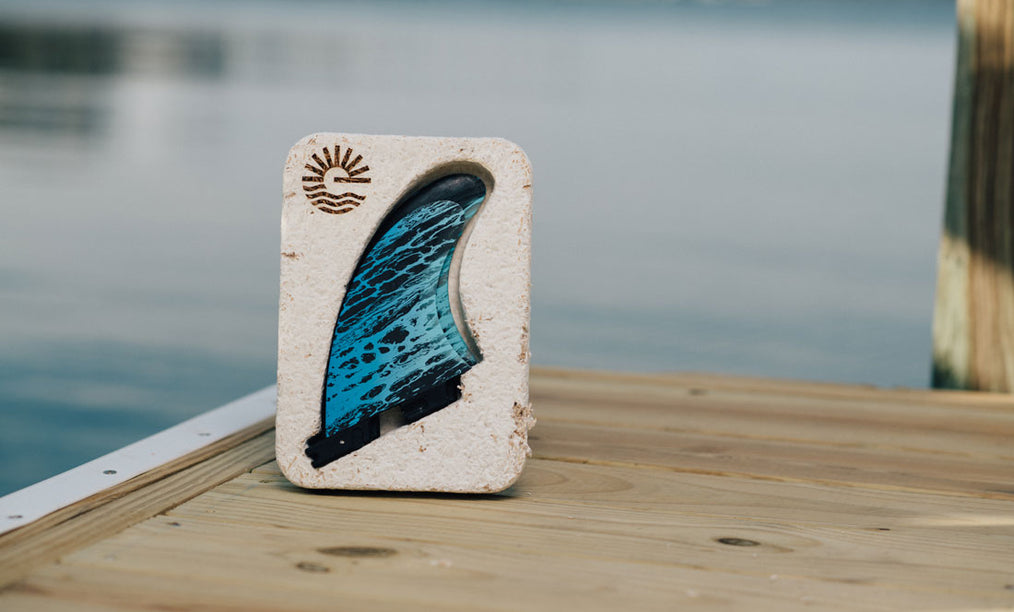Kelly Slater's brain doesn't shut off very often. That's been a blessing and a curse for the world's best surfer.
On the one hand you don't become an 11-time world champion at anything by being weak minded. But get Kelly talking about a subject he's passionate about and you'll find it tough to contain his enthusiasm.

Such was the case when Slater got an up-close look at The Ocean Cleanup's new Interceptor 007, their newest waste-capturing vessel residing at the mouth of Ballona Creek, in the heart of Santa Monica Bay.
Slater, 50, and best known for being the undisputed GOAT of the surfing world. He came to celebrate the installation at this occasion with Boyan Slat, 28, the celebrated CEO behind The Ocean Cleanup, and Wes Carter, 44, president of Atlantic Packaging, and founder of A New Earth Project.
With his youthful looks, Boyan could have passed for a college student on parent's day. He spent a few minutes giving his special guests a complete rundown of the system, and a few stories to go with it. This Interceptor is The Ocean Cleanup's latest milestone in their committed mission to rid the world's oceans of plastic pollution.
"How far does this conveyor belt go down into the water?" Kelly asks.
"About a meter, or three feet," says Boyan. "Most of the plastic floats, which is good for us. And when it rains it will all accumulate right here and be lifted up."

"How many iterations since Interceptor 001?" asks Wes. "I'm assuming hundreds?"
"Yes, and no single part is the same compared to the first Interceptor," Boyan explains. "The biggest thing is we had to make the conveyor belt wider."
"Is there a partnership with Cal Recycle or one of the agencies to come send a truck here when you offload the stuff?" Wes wonders.
"Yes, LA County has hired Ocean Blue to come and pick it up," Boyan replies.
"What's the price per city for one of these?" Asks Kelly.
"It's about $500,000 for the build, and another $500,000 for the installation, so about a million bucks," Boyan explains. "But the cost for cleaning beaches on the west coast of the United States is 500 million per year, so that's a drop in the bucket. And it's a lot cheaper to clean it here in a concentrated state."
The questions kept coming at Boyan for two hours.
"It's brilliant," said Kelly, summing up his feelings. "I like simple, low-tech things that work, and this thing looks like it'll work for the next thousand years."
THE BATTLEFRONTS
In the broader battle to keep oceans healthy, Boyan Slat, Kelly Slater, and Wes Carter are each playing interesting and impactful roles. While they operate on different battle lines, their respective spheres of influence, like three legs of a stool, are all critical. Sensing this, they used the rare opportunity of being in the same place to compare notes, swap stories, and mind map the great trash transition the world needs to make.
As president of the largest, privately held packaging company in North America, Carter sits furthest up the supply chain. He works hand-in-hand with many of the biggest consumer packaged goods companies on the planet. His realm is on the front edge of the product lifecycle.

As the GOAT of pro surfing (and arguably one of the best athletes of all time), Kelly Slater's impact on consumer behavior has been outsized for more than 30 years. His unique role influencing buying decisions puts him in the middle of the lifecycle.
Meanwhile, Boyan's Ocean Cleanup project is heading into its 10th year of action. He spends his days drawing attention to the massive graveyards of plastic waste destroying our oceans. These garbage patches are floating temples to our broken end-of-life systems and unsustainability of our linear economies.
While the Ocean Cleanup’s efforts began and continue in the Great Pacific Garbage Patch, where the focus is legacy waste, the Interceptors represent a crucial second prong. They're designed and built to capture fresh deposits of waste before they ever reach the ocean.
"It's a lot cheaper and more efficient to intercept waste in a river than to fish it out of the sea," says Boyan. It's also the easiest and best way to keep the Great Pacific Garbage patch from growing.
According to the latest large-scale study on the matter, our planet's top 1000 polluting rivers contribute 80% of ocean-bound plastic. The Ocean Cleanup's goal is to install Interceptors in all of them. They're developing several different models to support various sizes and environments.
Ballona Creek represents their 10th installation.
For residents of Playa Del Rey, and surrounding coastal cities, the Interceptor's impact became obvious within 24 hours of the first rain event. In the first day alone, it pulled more than four tons of waste headed for the ocean.
Previous rain events would have resulted in mounds of trash strewn for miles down the beach, much of it plastic packaging. But this time the beaches looked pristine.
LA County Public Works, who approved and oversees the Interceptor 007 idea in Ballona Creek, posted comparison photos on their Instagram, boasting of its initial success.
WHERE EVERYDAY IS TRASH DAY
Scaling Ocean Cleanup's Interceptors around the world can't happen fast enough for Kelly Slater. In the 35 years he's spent spanning the globe he's witnessed hundreds of horror stories related to coastal pollution. On a recent trip to Bali it got downright depressing.
"The trash was everywhere," he explains. "I couldn't ride a wave because there was so much. It was stuck on my leash. Finally, I gave up. I got out. It made me want to cry. I couldn't believe it."
Whether it's diapers, syringes, bottles or bags, the amount of plastic trash finding its way into oceans is reaching crisis leveles - especially in the global south -where many low and middle-income countries lack sufficient solid waste management programs.
"Waste infrastructure and waste management is expensive," says Boyan. "It's something like a trillion-dollar business worldwide. On a global level, basic waste infrastructure is the biggest thing we need to solve the plastic pollution problem. Most countries don't have a trash truck that comes every Wednesday. And they won't for some time."
In the global north our understanding and empathy around this issue is severely lacking. From our advanced-economy recliners we like to wag our fingers at developing nations and demand they get their waste management under control. It usually takes a visit to those countries, and time away from our hermetically sealed yoga retreats, to grasp the true scale of their problems.
Developing countries are, after all, developing.
Annually, the GDP for a country like Guatemala is 85 billion dollars. Apple, by comparison, grossed 83 billion in the last three months.
Guatemala may be the wealthiest country in Central America, but in the grand scheme, they're on the economic starting line. So it shouldn't be a surprise that waste management is lower on the hierarchy of priorities than food, roads, energy, and education. The same is true for almost every middle-income country on earth.
"They'll get there," says Boyan. "But we have to be pragmatic. It's going to take decades. Several decades."
Meanwhile, The Ocean Cleanup is already Guatemala, helping them tackle a huge problem in the Rio Las Vacas, which, due to a misplaced landfill upstream, has been one of the biggest contributors to ocean plastic in the world.
When seasonal flood events occur there, the river eats away at the landfill, bringing a tidal wave of trash downstream.
"This model of Interceptor wouldn't fit the river down there," Boyan explained. "It would be filled in 10 seconds, and that wouldn't be good."
"I saw the video!" Kelly replied. "The Tsunami of Trash! That was crazy."
"That Interceptor is our Trashfence model. It's like what you see in the mountains for avalanche protection. We're not trying to remove the waste as it comes, like this one. We're just trying to stop it so it can be removed later."
The Trashfence is designed for extreme seasonal events that feature massive deposits of waste. But the Ocean Cleanup team is designing a full quiver of Interceptor models so they have a solution for every type of river situation they encounter.
"Our hope is that we that we won't need them anymore in 50 or 60 years," Boyan insist. "They're not the ultimate solution. And they're not meant to be. They're a stop gap. Something to give the world time to get its act together."
RESEARCH, RIVERS, AND RED TAPE
System 001 "Wilson" hit some functionality and durability snags, which they were quickly able to address. System 002 "Jenny" validated their fixes, and achieved the waste collection functionality they were hoping for, confirming the technology on a larger scale.
System 003 is in its final stages of construction, with a target launch of spring 2023. This full-scale version is three times the size of System 002, but will catch waste at 10x the efficiency. While the name is still under wraps, oddsmakers like "Bubba," "Lt. Dan," or "Dottie.")
Over the next decade, The Ocean Cleanup's goal on the open ocean is to deploy fleets of this version into all five major garbage patches. Meanwhile, back near shore, the focus is stopping the waste before it can enter the ocean.

Open-ocean systems are larger capital investments, but easier to scale since all models are the same. Interceptors, meanwhile, are far less expensive, but require more custom fitting, and more navigating of red tape. "Every river is different," says Boyan. "From the type of trash you're expecting to come down, to the types of authorities you have to deal with."
Politically, economically, culturally, rivers can be hot button zones. Every river on earth has multiple stakeholders. After all, water is life.
But the biggest stakeholder is our oceans, which are unrepresented. When treated right, rivers deliver essential nutrients to our coastal habitats that are home to 70% of our oceans' biodiversity, including 100% of our carbon-sequestering mangroves, 100% of seagrass, 100% of kelp forests, and roughly 83% of coral reefs.
Technically, anything within 12-miles of the coast is considered Territorial Seas, which are jurisdictions controlled by coastal nations. While they makeup just 6% of all our oceans, Territorial Seas supply the vast majority of our human needs. Today, more than 3 billion people rely directly on the ocean for their livelihood. They're supported by 60 million who work in small scale fisheries. 40% of the global fishing catch comes from Territorial Seas, and all of that goes to food consumption.

Sadly, only 12% of ocean philanthropy is dedicated to conservation of these crucial waters. Most marine protection efforts exist offshore because there’s far less friction, and far less to protect. But maintaining the biodiversity of our Territorial Seas is essential to our survival, and protecting rivers is an essential piece of that equation.
For Boyan and The Ocean Cleanup team, navigating the red tape related to rivers isn't easy, but it's vital. "Some places are very straight forward, but in other places you need sign-off from 15 different authorities, sometimes all the way up to the national level. So, when you think about the challenge of getting Interceptors in 1000 rivers, that's enormous."
THE GREAT PLASTIC PANDEMIC
A lot of the changes that need to be made in the great trash transition revolve around shifting behaviors. And what's tough for individuals is even tougher for societies. But sometimes rapid change comes unexpectedly. The COVID pandemic was a global nightmare. But its silver lining was an awakening that none of us will soon forget.
One of the first things that shocked us was just how quickly nature can rebound...if we let it.
Our self-imposed stillness cleared the skies even in our major smog-filled metropolises. The increased visibility and the absence of noise and air pollution was so surreal and miraculous that many bird and animal species reclaimed areas they'd abandoned long ago.
And while those creatures were rebooting, we were too.
We headed outdoors in droves and reconnected with nature, and it felt good. We wore the same clothes over and over, and liked it. And we balanced our work with our lives, and wished we'd done it sooner.
But on the flip side, our reliance on food takeout and home deliveries went parabolic. Suddenly everything showed up, touchless, at our door. Boxes and bags stuffed with single-use plastics littered our houses. And two years later, the packages haven't stopped coming.
Sure, all that junk goes in bins and gets hauled away, but we know now that only a fraction of what we put in our blue bins is being recycled. When our supply chains broke, many of us got took our first hard look at product lifecycles. The takeaway: it's not just our supply streams that are broken, it's our waste streams too.
Ballona Creek's waste isn't the problem, it's the symptom. The big plastic pollution problem is way upstream, where Kelly and Wes operate.
DOWN WITH THE VIRGINS
For most of his career, Kelly Slater never gave much thought to the impact his clothes were having on the environment. After all, the lifeblood of his entire career was an industry comprised of fast-fashion brands pumping out hundreds of new skus per season. But Slater's mind began to shift once he became an early adopter of Twitter. That's when he started spending a lot of time reading people critical of the apparel industry.
A few years later, when Slater decided to start his own label, Outerknown, he sought out partners up for a challenge."I wanted to prove a sustainable line could be done, that I could, number one, take care of people from a social compliance standpoint, but also create a supply chain that was healthier for our environment. So, it was going to be for people and the planet, which became our tagline."
Today, Outerknown's goal is to keep their products in circulation forever. Last year they launched a circularity program that lets customers buy and sell pre-owned pieces. Their goal is to be 100% circular by 2030. "We’re not trying to be preachy," says Slater. "I just want to try to be educational and let people know that stuff."

"I'm not okay with my industry being such a huge part of this mess," says Wes Carter. "About 45% of the manmade waste coming down these rivers is packaging. Last year in the United States we only recycled 5% of post-consumer plastic waste. We're using way too many single-use plastics where we don't need to be. We need to transition out of it. And frankly, I don't think we have the luxury of waiting."
The impact of solid waste on our oceans wasn't nearly as severe before the mass proliferation of single-use plastics. It wasn't all that long ago that glass, aluminum, fiber-based bags, and boxes were the norm on store shelves. And our elders lectured us routinely on how to maximize their use.
But plastics dominate our lives today. They can be hard, soft, light, heavy, brittle, bendy, clear, colored, and flexible. Plastics are in our cars, our clothes, our toys, our tools, even our bodies.
Petrochemical companies are so skilled at producing cheap, effective, good looking plastics that they're almost impossible for producers to resist, especially given the job they do. They're strong, durable, secure, and lightweight.

The big problem with plastics being so cheap is its monetary return value is non-existent for consumers, not to mention recyclers who can't compete with the virgin resins. So, producers stick with the clean cheap stuff, and the linear system that clogs our landfills, rivers and oceans continues.
"It's all about economics," says Boyan. "If plastic were more expensive this problem wouldn't exist. If you think of aluminum, the recycling rates of aluminum around the world are something like 80% to 90%. Super high. Why? Making new aluminum out of bauxite takes a lot in energy, which is costly, so it's always cheaper to make aluminum from existing aluminum. But the only time there's a financial incentive to recycle plastics is when governments artificially change the equation," says Boyan.
Indeed, when there's no financial penalty for using virgin plastics, and no financial reward for not using them, companies are incentivized to keep profiting off of their pollution. Meanwhile, the rest of the world pays the tab for cleaning up the mess.
"I feel like maybe there's a certain tax that needs to happen," Slater said. "Just specifically for the waste they create."
The broader policy term for what Slater is thinking about is called Extended Producer Responsibility (EPR). EPR policies come in a variety of shapes and sizes, but the gist is always the same: put the producers of waste products on the financial hook for properly managing the waste they create.
EXTENDED PRODUCER RESPONSIBILITY
Wes Carter works with lots of plastics. "Look, they do an amazing job protecting things," he explains. "Preventing food waste is the most glaring example of where it plays a huge role. That's a big environmental issue tied to energy, land use, water use, and the rest. When you lose 100% of the time and effort of bringing something to market, that's a big environmental hit."
Fortunately, Wes' company is more than a commodity broker. Atlantic Packaging does a lot more than sell envelopes and boxes and protective wrapping. They're a tech a design driven solution center. They test, optimize, and integrate entire packaging systems. Carter's engineers, designers, scientists, and sustainability experts help clients understand the tradeoffs associated with every option available. "Many of our clients are dying to get more sustainable, but they want to understand how. That's what we teach them."
The reason why Wes is eager to get behind EPR programs is it forces the issue. "When companies are incentivized to pollute the environment it's more likely they will," he explains. "Unfortunately, that's the system we currently have. EPR will change that. It equals the playing field for more sustainable options, and it's going to lead to a lot more scaling in that area."
Viable sustainable solutions need to check a lot of boxes, none bigger than functionality. "Does it work?" Says Wes. "That's the most important one. Does it protect the product? How's it made? What's their feedstock? How's it grown? Can this scale? Is it backyard compostable or industrial compostable? What's the price?"
Carter's personal motivation around sustainability isn't hard to find. He's a surfer, skier, diver, hiker, and hunter. Then there's the deeper motivation, tied to his kids, his father, and his grandfather, W. Horace Carter, who started the company 75 years ago leaning directly into the pressing issue of his generation.
"He's still the beating heart of this company," says Wes. "He's the one who instilled the ethos and the energy and the soul that's still guiding us today."
Horace Carter's dream, after WWII, was to start his own newspaper business. In 1946 he moved to Tabor City North Carolina and started the Tabor City Tribune, a small weekly. "Back then, if you were in the newspaper business, especially in small town America, you were also in the paper-supply business," says Wes. "Packaging began as his side hustle."
To Horace's shock, the Ku Klux Klan was highly active in the area. Despite threats to him, his wife, and his family, Horace unflinchingly published furious attacks. His scathing editorials and detailed reporting caught the attention of big city papers, who syndicated them around the country. Eventually, the FBI rolled into town, and made a bunch of arrests based on Horace's reports. Those arrests broke the back of the organization. At 32, Horace and his little weekly paper were awarded the Pulitzer Prize for Meritorious Public Service.
By the time he retired to Florida to write fresh-water fishing books (dozens in all)his local celebrity status helped him keep both businesses thriving. He handed Rusty, Wes' father, the keys and wished him luck. "It turns out, my dad was way more of a businessman than my grandfather," Wes explains. "He's guided Atlantic from a million-dollar company to a billion-dollar company. And when you get to that scale, you earn a seat at the table and the opportunity to work with some of the biggest brands in the world. My dad did all that."
Not surprisingly, in the age of climate change and plastic pollution, Wes knows what his tenure at the helm will be driven by. "I feel very fortunate," he says. "When my father decided to get us focused on optimization years ago, that really bolstered the foundation of the sustainability push we're making today. Because the first rule of sustainability is 'use less,' and that's what optimization is all about."

Atlantic Packaging helped remove more than 30 million pounds of plastic from product supply streams last year. When they can persuade a company like Proctor & Gamble or Coca Cola to move one SKU into a more sustainable packaging or shipping container, the impact is huge. That's the value of having a seat at the table.
Back in June, California passed the most ambitious EPR bill in the world with broad bipartisan support. "It's a few years out, but if it gets implemented properly it could really be a template for the rest of the world," says Wes. "This is the kind of push we need to force the issue."
The bill's biggest target is single-use plastics, including a de-facto ban on EPS food-ware packaging, but the larger objective is to make 65% of all packaging materials recyclable or compostable by 2032.

It also means brands and producers will be forced to communicate with waste haulers, material recovery facilities, and recyclers before they start designing their packages, to ensure the stuff their making fits the system. "And that's never happened," says Wes. "That's a game changer."
By forcing all stakeholders in the supply chain out of their silos and into the same room, more circular systems can be designed thoughtfully, carefully, with a much greater chance of success.
"It's interesting," says Boyan, "Interceptors are often great conversation starters to the whole EPR discussion. When people see all the waste, the first thing they ask is, 'That's awesome, what are you going to do with it?'"
Slater walked away from the gathering feeling emboldened. "I'm really inspired by the work you guys continue to do," he said. "It keeps it present in my mind. It keeps me aware of the problem and that's what we all need to be thinking about. I appreciate all you guys."
